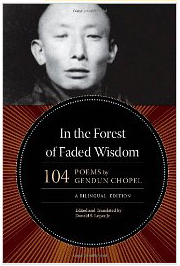 Join us at the Tricycle Community Poetry Club from July 26th through August 2nd for a discussion with Professor Donald S. Lopez Jr., the translator and editor of In the Forest of Faded Wisdom: 104 Poems by Gendun Chopel. A highly regarded modern Tibetan poet, Gendun Chopel is also known as “the angry monk.” Here is Lopez’s commentary on poem number 33. The poem itself is below:
Join us at the Tricycle Community Poetry Club from July 26th through August 2nd for a discussion with Professor Donald S. Lopez Jr., the translator and editor of In the Forest of Faded Wisdom: 104 Poems by Gendun Chopel. A highly regarded modern Tibetan poet, Gendun Chopel is also known as “the angry monk.” Here is Lopez’s commentary on poem number 33. The poem itself is below:
When Gendun Chopel departed from his home in Amdo, setting off for Lhasa and Drepung Monastery in 1927, he was accompanied by an uncle and his son, Gendun Chopel’s cousin. The three parted ways in Lhasa, with the uncle becoming a meditator and the cousin doing odd jobs to earn money to support Gendun Chopel and his father. Several years after arriving in Lhasa, the cousin was killed in an accident. Gendun Chopel wrote this poem about his death. This is perhaps Gendun Chopel’s most poignant poem, combining powerful Buddhist imagery with a deep expression of grief. There are many Buddhist stories of equanimity at the death of others, even family members, because death is the fate that awaits all those born into samsara. Gendun Chopel knows that to be true—he alludes to classical Buddhist teachings at several points in the poem—yet this knowledge does little to counter the sense of loss at the death of his childhood friend.
33. The wealth of the world is mist on the mountain pass. My closest friends, but guests on market day. Uncertain joys and sorrows are last night’s dream. I think and think; they have no essence. Led by the unknown envoy of Yama, My friend wanders the long and narrow path to the next life. Sublime refuge, three divine foundations, Please be his compassionate guide. Being born then dying is the nature of samsara. Its manifestation, the illusion that nothing changes. The royal decree of relentless Yama Has befallen my helpless friend. When the drizzle of past prayers and deeds is falling The afternoon rainbow appears, seeming so real. When the sun of yearning begins to shine It vanishes in the realm of invisible sky. Dear childhood friend, radiant half of my heart, When the flower of youth blossomed, The streams of our minds mixed. Where in the six realms could you be now? At the end of three days of bountiful friendship In the narrow riverbed of Gyisho Lhasa We promised to meet before too long. The time has come to meet within a dream. All beings, old, young, those in between, See what unpredictable death looks like. Yet there is no means to end the inner grief Of those left behind by childhood friends. To feel remorse at someone’s death is foolish; It only ruins the body and mind. Yet I cannot overcome the accustomed, This habit of mind so long familiar. As your body lay dying, a skeleton’s image appeared; Hoping only to remain alive, You stared with death’s eyes, If what they say is true, it devours my heart. In the way things appear to the ordinary mind, You are still with me; you seem so real. When the bow of memory is bent, It only causes an empty heart. Pondering how love and friendship endure, I dispatch to my friend in the land beyond The few good things I’ve done In the field of the infallible three jewels.
Thank you for subscribing to Tricycle! As a nonprofit, we depend on readers like you to keep Buddhist teachings and practices widely available.